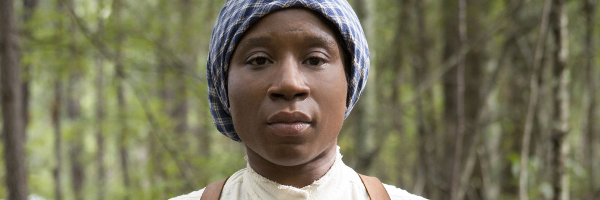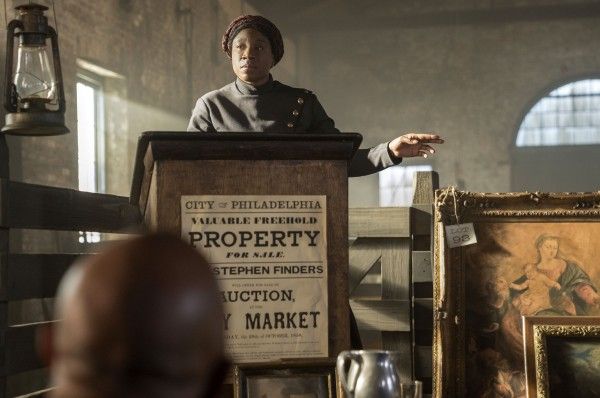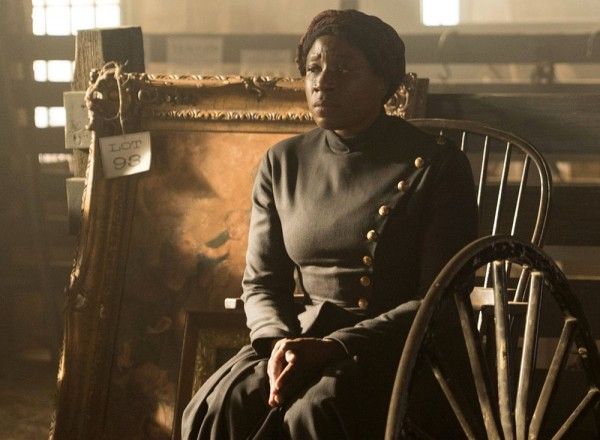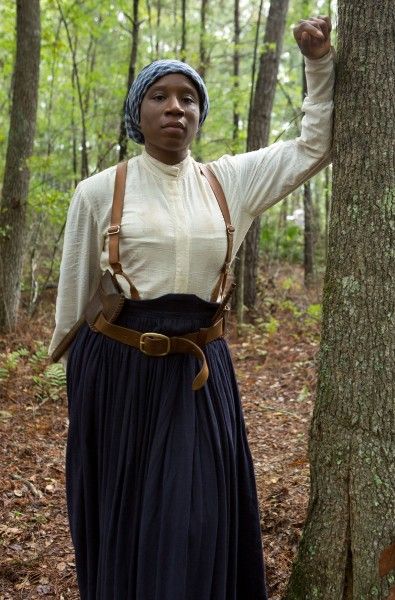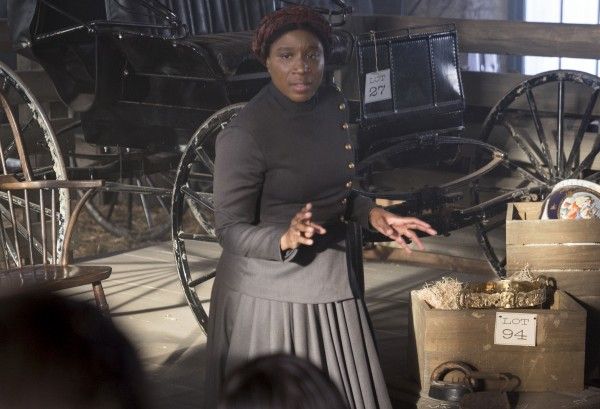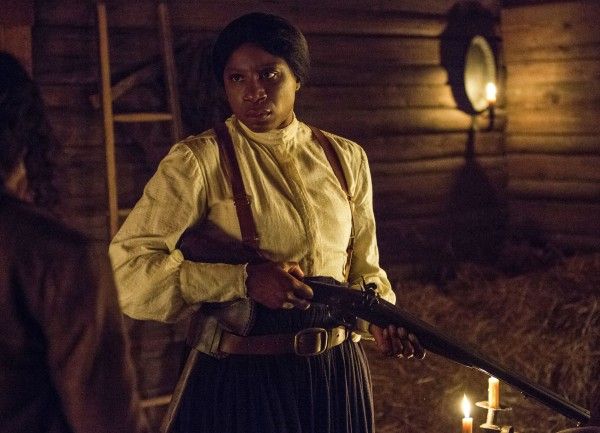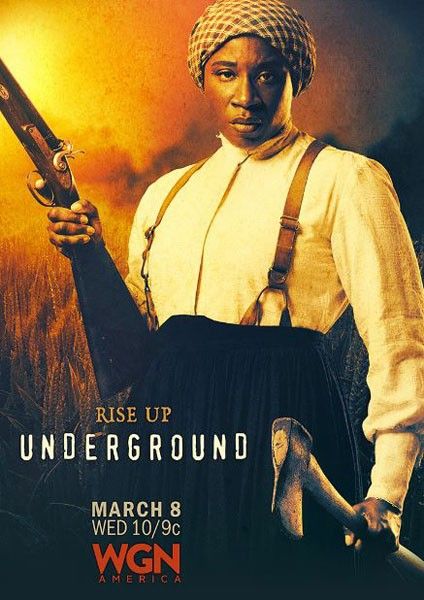The episode of the WGN America drama series Underground entitled “Minty,” featuring a solo performance by actress Aisha Hinds as Harriet Tubman, is an episode of television that is not only groundbreaking in what it presents to audiences, but it is awe-inspiring in what is truly a mic drop acting moment. In watching it, it is impossible not to be profoundly moved by the heart and soul of a woman who made such huge contributions to this country, at the same time that it is a chilling reminder of how easy it is to see the dark side of history repeat itself. And it is an episode of television that should not be missed.
During this 1-on-1 phone interview with Collider, actress Aisha Hinds talked about how nervous and excited she was to take on the role of Harriet Tubman, what her audition process was like, the crazy schedule she had to learn the material and shoot the episode, having the shooting experience feel completely out of body, relying on the spirit of Harriet Tubman to guide her, how relevant all of this is to what we’re experiencing today, and what it’s meant to hear to be the vessel to make all of this happen.
Collider: First of all, I have to tell you that “Minty” is one of the most incredible hours of television that I’ve ever seen, and if we were doing this interview in person, I would give you a standing ovation for your performance in it. So, bravo!
AISHA HINDS: Thank you very much. That’s so kind. Thank you!
When the possibility of playing Harriet Tubman on a show like Underground came about, what was your immediate response? Were you more nervous or excited about taking on something like this?
HINDS: Both of those things. There were a myriad of emotions that filled my body, once I knew that this was happening. Once it did happen and once the announcement was officially made, I wept. I make that distinction because I think that crying is a response to anguish or pain, but I feel like weeping is something that happens when your soul cracks open and out comes this flood. So, there was a flood that came rushing from my eyes and I just wept and wept. It emptied me of all of those emotions – the excitement, the nerves, and everything – and in doing so, it made room for the spirit of Harriet Tubman to enter into the space that was now emptied. Her spirit consumed that and occupied that place, which was the only thing that I can credit with allowing me to take on the responsibility of this project, and to carry the weight and the burden of absorbing an entire episode as one single character, which I have never done in the history of my career. I was doing it with people who had never done it before either, but I was also doing it with people that I trust implicitly, like Anthony Hemingway, Misha Green and Joe Pokaski. I’d known Anthony prior. He’s a friend of mine. So, it made it that much more special. Knowing that he would trust me and entrust me with the responsibility of such a heroic, iconic character and such a pivotal part of the story, I wanted to do nothing less than honoring him while I was honoring her.
Was this something you had to audition for?
HINDS: I did have to audition. Initially, when Anthony mentioned it to me, I said, “Whatever it takes, I’ll fight for it,” but I was kind of just saying that. I honestly didn’t believe that I was going to be a contender. I didn’t think that I was adequate enough to take on such a huge figure. I had grown a little bit complacent in the work that I was doing. Though I knew that I was uncomfortable plateau-ing in that space, I hadn’t yet been given proof or information that would let me know that I was capable of taking on someone as iconic, brave, courageous and amazing as Harriet Tubman. When it was announced and there was this overwhelming outpouring of support from fans, friends, family and strangers, it illuminated for me that I needed to open my eyes just a little bit wider to see what they were seeing that I wasn’t seeing. So, I had to audition, and even that was a stressful situation.
Anthony mentioned that they were going to be auditioning for Harriet in the new season, and we talked about it over the summer because auditions were happening over the summer. I actually got a book and started reading about her, and the more I read, the more I felt incompetent. I was like, “There’s no way! This woman is amazing!” I reached out to a friend of mine who’s an actress and I said, “Listen, they’re auditioning for Harriet Tubman, so you get in there. Even if they tell you that you’re too young, you tell them no and you get in there and audition.” I was passing the ball. And then, she called me and said, “They actually auditioned me for a different role.” At the time they gave me the appointment to come in and audition, I was contracted to do another project as a series regular and the dates with that project were going to conflict with the second season of Underground, so as quickly as it came, it went away, on the same day. I was so down and bummed that I couldn’t audition, even though I didn’t see myself actually booking it, because the possibility wasn’t even though. And then, I thought, “Why even take the possibility out of my hands?” I fought for the opportunity, so that if they didn’t go with me, it wasn’t because I didn’t show up in the room and audition. It was because I wasn’t right.
So, two days later, which was the day of the audition, I got a call when I was at breakfast with an actress by the name of Niecy Nash. They were like, “You know what, Aisha? They’re going to see you today. Go in, and we’ll figure out the other contract, if they want to go any further.” I was like, “Today?! Can’t we do it another day?!” And they were like, “No, today is the last day because the producers are leaving.” So, I literally got the material on the day of the audition and I was frantic. Niecy reached across the table and was like, “Honey, calm down. I just prayed for you. That’s your role. Now, do you want turkey bacon or turkey sausage?” We had breakfast and she said, “Now go home, get dressed, learn your lines, and go get your role.” I drove down to the audition and sat there for about three hours before I was supposed to go in because I was so full of nerves. I was trying to learn the lines, but I also had the Harriet Tubman book that I had been reading. I decided to read as much of the book as I could because I wanted to inhale as much facts and information about her as I could. I thought it was more important to absorb the essence of her before I walked into that room. I didn’t want to preoccupy myself with just saying words. I wanted a spirit to be behind those words and I wanted the details of her life to be behind those words, as much as I could.
I took the last half-hour to learn the lines, and then I walked in and sat in the lobby, where I saw people come in after me and leave. It was so strangely structured that I ended up being the last person to walk into that room and audition. Anthony Hemingway was sitting there with this posture that was so warm and welcoming, and he stood up and gave me a hug. I can’t even describe what happened in that room, but I was happy that I went in. I was happy that I didn’t listen to the first no that came in, and that I didn’t allow myself to be blocked from the opportunity and that that opportunity unfolded into what we have now, today, which is an unprecedented performance that could have slipped through my fingers.
How long did you have to work on this particular episode? Did they give you any extra time?
HINDS: It seems like that would be the nice thing to do. That’s what I thought! When I went down there to start the season, we had a meeting and started talking about this [episode]. I thought I would get the script pretty soon and have the opportunity to work on it, over the course of the season, as we were shooting the other episodes, to set us all up for success, but that was not the case. So, when I realized, after being there for a month, that I wasn’t going to get a script, I thought that I would surely get the script at least a month before. And then, a month before came and I didn’t get a script. And then, three weeks before came and I didn’t get a script. And two weeks before came and I didn’t get a script. I literally got half the script, 10 days before, and then the other half, seven days before. That was not the curriculum that I had in mind. That’s not what I thought was going to happen, at all. I was frantic and reaching out to all of my theater friends. I reached out to my theater professor and was like, “Is it impossible for me to learn an entire 45-page script in a week?” And he emailed me back and was like, “Not possible. Now, get to it.” There was this running theme that this was just not possible. People were telling Misha, Joe and Anthony, “Listen, this episode, I don’t know if it’s possible.”
Everyone was trying to create safety nets because we all were attempting something we had never attempted before. Misha and Joe had never written a one-woman show. Anthony had never directed a one-woman show. I had never performed a one-woman show. This is not something done on TV, at all. Even for our crew, this was foreign. They had never shot 17 3/4 of a page in one day of shooting, ever. This was a revolutionary experience that revolutionized all of us, as artists and as human beings. There were people that came up to me, after that first day, who said they’d been working for over 40 years in this business and had never experienced something like this. What we were able to accomplish in the three days of shooting that we had wasn’t lost on me. Not only did I get this script seven days before, but we only had three days to shoot it, and the standard is six to eight days. The importance of a divine presence that was necessary to accomplish this goal was also necessary for Harriet, as she led people along the Underground Railroad. She spoke so much about that spiritual compass, and how God was guiding her and would give her routes to take. It was that same thing. We relied on the divine direction to get us through those three days, so it wasn’t lost on me. I thought about the biblical significance of three days, and it was akin to that. There was a power at work, in those three days, that allowed us to cross the threshold from impossible into what became possible for what we have now.
This is such an important episode of television because, through entertainment, it also educates, and you give monologue like no one I’ve ever seen. Did you have a moment when you felt like you’d really had this, or was it more out of body?
HINDS: Yes, it was all out of body! I spent so much time trying to stuff my brain with these 45 pages. I got the pages a day or two shy of the Thanksgiving break, and production shut down, so I canceled Thanksgiving and went home. A friend of mine canceled her Thanksgiving and flew from New Orleans to stay with me and run lines, every day, from morning to night. I felt such a sense of accomplishment when all 45 of those pages were stuffed into my brain, and at the end of that, I was exhausted and ready for bed. I woke up and felt like I was recharged because I was so excited. And then, on my way to the airport, I started to feel sick. I threw up on the plane, and when I landed in Savannah, my temperature had spiked to over 100. I had a fever and I drenched the entire hotel bed, sweating profusely. When I woke up the next day, my cycle had started too early. Literally, blood, sweat and tears were enveloping the moment, and all of the anxiety was hitting me.
I showed up to set and I was starting to panic because I’d wanted the time on the plane to rehearse the lines that I’d learned. I lost the time to do that, and now had to sleep to try to get well and break the fever. I was upset and crying because I didn’t have time to rehearse, and I was losing that sense of control that I felt like I had over the situation when I learned the lines. It was all disappearing from me. And then, I lost my safety net. They said they would have an ear piece that I could have in my ear, so that if I ever forgot a line, Misha would sit behind the monitor and feed me the lines. In learning the dialogue, I always had that safety net in the back of my mind. So, I showed up to set, went to the sound card, greeted the guy and told him that he was the most important person to me, and I put it in my ear and there was tremendous static. I asked him if he could turn the static down, and he said, “No, that’s standard. The static lives in your ear until Misha starts speaking to you.” I realized that I couldn’t do it with the ear piece in, so I pulled out the ear piece and handed it to me, and I knew, at that point, that there was no safety net. Everything that I thought I could rely on, I couldn’t rely on. I reached for the only thing I knew I could do, and that was to pray for the spirit of Harriet Tubman to enter that space.
When I walked into that stage to start, Anthony said that we were going to do a rehearsal, but that he was also going to shoot it, just in case. I was so scared, but when he called, “Action!,” that was the moment that I knew I wasn’t in control. There was no reason for me to think that I needed to rely on my own strength or my own abilities or my own craft. There was no craft. All I had to do was rely on the spirit of Harriet Tubman, which is what happened. She consumed me, and out came her story. I don’t even remember it. A part of me is so afraid to watch because I don’t want to experience it outside of the experience I had while I was there. But at the same time, I also want to experience what our audiences are experiencing and celebrate the work of everyone else that was involved. I’m just happy to be on the other side.
Aside from all of the dialogue, you also sing the very moving “Go Down Moses.” Was that more or less nerve-wracking that the speech?
HINDS: That was way more nerve-wracking. I didn’t know that they were going to incorporate her singing into it, and they didn’t even ask me if I could sing. That is the thumb print of Misha Green and Joe Pokaski. They push all of their actors and actresses to the edge of themselves. We have to dig for every single part of us. I had to dig up those musical theater skills from college and sing. At first, I was very nervous about it, but then, in the context of the story, it felt so right and so beautiful. It felt like a spiritual moment that added to what felt like such a defining experience.
The very end of this speech, where you speak directly to the camera in close-up, feels so much like it’s speaking to today and what we’re going through in this country, with this current President. Was that intentional?
HINDS: I think it was definitely intentional. Although Harriet is speaking to the audience of abolitionists, she’s also speaking to the audience of Underground and to the audience of this world. It’s no mistake that Harriet Tubman is revisiting us, in different forms, right now, as we travel through a very contentious time in the world. Her spirit is one that we absolutely need today, as we face odds that are akin to the divisive and systemic oppression that we read about in our history books, but it’s taken on a modern-day articulation of itself. I almost believe that Harriet Tubman asked God for a leave like, “I’m gonna need to go back down there and take care of some things. They’re in trouble.” I think it was definitely a deliberate convention that was woven into our story, and it engages audiences to be a part of the movement.
What have you most enjoyed about the opportunity to live in the shoes of this woman, and not only remind people of her contributions to the world, but also introduce a new generation to her accomplishments, for the first time?
HINDS: I’m honored. I’m honored to be the vessel that reintroduces this amazing human being to the world. It was astounding for me to learn, in my research, that she had lived so long and was tucked away in Auburn, New York. She had lived so long that she became old hat. She wasn’t a marvel in that area. What I would give to know that Harriet Tubman lived down the road, or to have the opportunity to sit at her feet and have her share her story. This is one of those unique opportunities to sit at the foot of her history and hear it. I think it’s a beautiful thing for this generation to hear, and I think it’s also good for people of all ages to be reminded of this important contributor to the fabric of this country. Harriet is in all of us. I’m thrilled that Underground is challenging audiences to learn from her and to see her, but to also see themselves in her.
Underground airs on Wednesday nights on WGN America.

